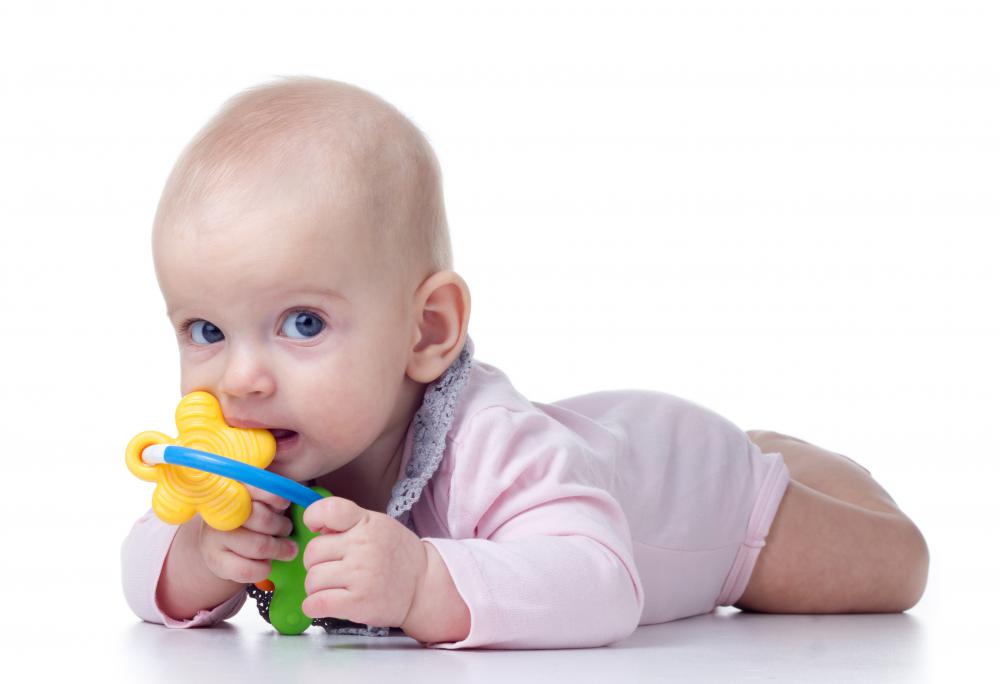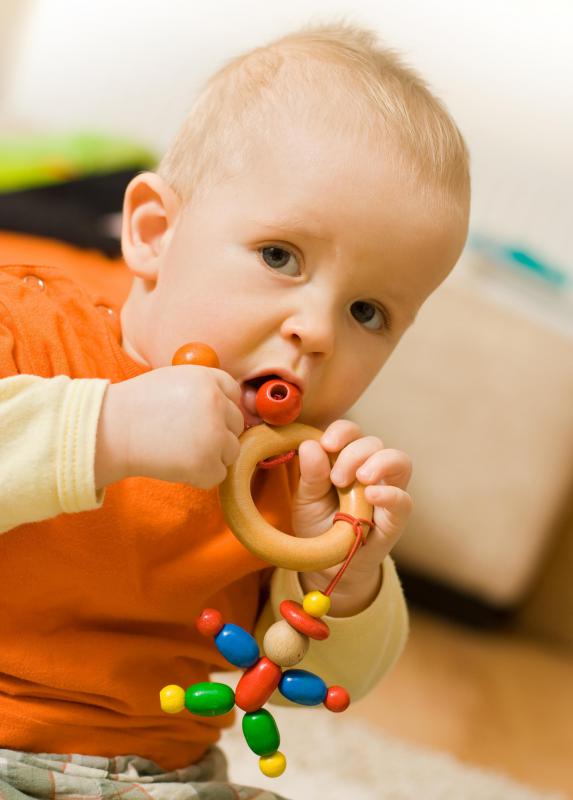At WiseGEEK, we're committed to delivering accurate, trustworthy information. Our expert-authored content is rigorously fact-checked and sourced from credible authorities. Discover how we uphold the highest standards in providing you with reliable knowledge.
Why do Some Babies Develop a Teething Fever?
Babies who are teething commonly develop what is known as a teething fever. Caregivers often ascribe the fever to the process of teething itself, but the medical community has not found any evidence to support this. Doctors believe that the swollen and inflamed gums of a teething baby, as well as a baby's tendency to put any germ-covered item into his or her mouth, can set the stage for an opportunistic infection. This infection would cause the body to develop a low-grade teething fever as high as 101 degrees Fahrenheit (38.3 degrees Celsius) that might last for two or three days. If the low-grade fever is accompanied by other symptoms, such as ear pulling or the fever rises to 102 degrees Fahrenheit (39 degrees Celsius), a call to the doctor most likely is in order.
About the eighth week of pregnancy, a baby begins to develop tooth buds, which will start to break through the gum line when he or she is between 3 months and 7 months old. As the teeth begin to erupt, they literally must create a hole in the gum tissue where the new tooth will sit. This process puts pressure on the gums, making them swollen, sore and sensitive. The baby chews on just about anything to help the tooth break through the gum line and to relieve some of the pain.

Having no concept of germs, the baby does not care whether the object he or she is putting into his or her mouth is clean. Many things that a baby puts in his or her mouth will be full of germs. The germs promptly take advantage of the newly developing hole in the baby's mouth and his or her vulnerable immune system. The germs enter the baby's body at the site of the new tooth, and the baby gets sick, developing a low-grade teething fever. Baby fevers usually arise one or two days before full tooth eruption and last for about one day afterward.

Caretakers should not assume that a baby's fever is the result of teething. If a low-grade fever persists for more than a day or two, or if it increases to more than 102 degrees Fahrenheit (39 degrees Celsius), a visit to the doctor probably is warranted. This is especially true if the teething fever is accompanied by other symptoms, such as ear pulling or diarrhea, or if the baby is unable to be consoled.

To decrease the chance of the baby getting sick, what the baby chews on should be monitored. It is important to allow a baby to chew only on clean baby toys, teething biscuits or a clean frozen washcloth. Keeping other items out of the baby's reach will greatly reduce the chances of germs getting into his or her mouth and starting an infection that causes a teething fever.
AS FEATURED ON:
AS FEATURED ON:













Discussion Comments
I think some children get a fever when they're teething because their gums are painful and itchy. They want to bite down on things to relieve the irritation and they will usually grab anything and everything and put it in their mouth. So they end up getting a lot of germs during the teething process which can contribute to a fever.
@burcinc-- All babies do not develop it but it's common enough that it's listed as a symptom of teething. But as the article described, we're talking about fever that is less than 102 degrees and does not last very long.
It's definitely possible for a baby to have fever due to infection while also teething. So the fever is definitely something that needs to be watched. If you find that it is constant for many days and/or is increasing to above 101 degrees, see a doctor immediately. This means that there is an infection going on.
My son's doctor said that a mild fever only occurs the day the teeth actually comes through and perhaps the day before. So fever that lasts more than two days is definitely something to worry about, especially if the tooth is not coming through just yet.
Do all babies develop teething fever? My daughter is teething and she does have a mild fever. Do we need to see a doctor about this or not?
I'm worried that she might have an infection. I don't want to ignore the fever. This is my first baby so I just don't know what to expect. I knew she would have some discomfort and irritability during the teething process but I wasn't expecting fever.
Post your comments